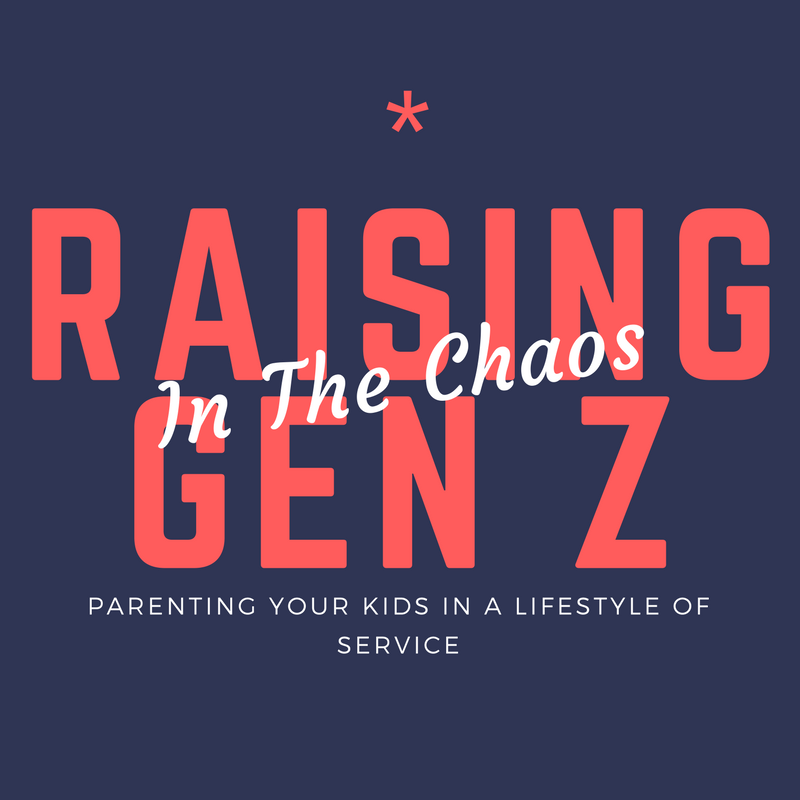-
What’s Going On Down There? Women’s Health
Ok- so first a heads up- we are going there in this episode. We will be talking all about the female anatomy! Guys- this one is for you, too. There is so much women are not educated on and the pelvic floor is just one of them. Ashley Gammon, founder of M.O.M.S. (Military Outreach MUTU System) is my guest! After three C-sections of her own, something wasn’t right. She didn’t feel as strong, wasn’t making progress in her fitness goals, and was experiencing a whole lot of symptoms that you are likely experiencing but didn’t know there was help for.

Ladies, the trampoline is definitely in your future and so are those HIIT programs and everything else you’ve been avoiding because… let’s be honest. After kids, things just aren’t the same. But Ashley says that none of us have to live that way. If you are interested in taking care of your own body and health again and are ready to reclaim your sex life, that trampoline, and get things back where they originally were, check out: www.mutustrong.com

Connect with Corie Weathers! www.life-giver.org www.corieweathers.com
Join the conversation and participate in future shows! @CorieLPC
-
Living Out Your Strengths Series
Part 1: Be Confident in Your Superpowers
In this series, join Katie Christy and I as we completely nerd-out on the power of living out your strengths. All of us are good at something. None of us are good at everything. What if you figured out what you are created to do really well, maybe already do really well- and then get even better at it? Welcome to being a superhero.
[podbean type=audio-rectangle resource=”episode=gh42t-97de5c” skin=”1″ auto=”0″ height=100 ]
Part 2: What are YOUR Strengths?
[podbean type=audio-rectangle resource=”episode=uuuuc-97de5b” skin=”1″ auto=”0″ height=100 ]
Part 3: Strengths Parenting
[podbean type=audio-rectangle resource=”episode=jre7t-980b46″ skin=”1″ auto=”0″ height=100 ]
-
Raising Gen Z (In the Chaos) Series
Ep 1: Raising Emotionally Safe Kids
Parenting is hard enough, but raising kids in a lifestyle of service sometimes feels even harder. For military there are constant relocations that make you wonder after a while if you are causing more harm than good. Accepting the call to a service lifestyle is a deeply personal one. Putting your life on the line for country and community is a sacrifice that impacts your entire family. In this interview I speak with Dr Joshua and Christi Straub, a couple doing outstanding work in the field of parenting. Joshua Straub, Ph.D., has two cherished roles—as husband to wife, Christi, and dad Landon and Kennedy. He serves as Marriage and Family Strategist for LifeWay Christian Resources and leads Famous at Home, a company equipping leaders, organizations, military families, and churches in emotional intelligence and family wellness. As a family advocate and professor of child psychology / crisis response, Josh has trained thousands of professionals in crisis response. He also speaks regularly for Joint Special Operations Command and for military families across the country. Josh is author/ coauthor of four books including Safe House: How Emotional Safety is the Key to Raising Kids Who Live, Love, and Lead Well and creator, along with Christi, of TwentyTwoSix Parenting, an online community of parents offering discipleship tools for their kids. Together, they host the In This Together podcast and their weekly Facebook Live broadcasts reach tens of thousands of families. Joshua and Christi have the “In This Together Podcast” where they address topics on parenting and marriage as well as their 22:6 Parenting Curriculum that gives you everything you could possibly need to succeed as a parent including- – A supportive group environment, – Tools to use with your kids and – Monthly curriculum for you to download each month. To listen to our interview on their “In This Together Podcast”
Ep 2: Raising Teens
Do you have a pre-teen or teenager? I am so excited to share with you my interview with Gary Allen Taylor from Axis. Axis is an organization whose mission is to empower the next generation to think clearly and critically about what they believe and to take ownership of their faith. They do this not by outsourcing parents, but by resourcing them to disciple and transfer legacy to their children as they face life’s questions and challenges. We also support faith leaders in churches and schools by providing content and facilitators who effectively introduce and address life’s toughest topics. Raising Generation Z kids is all about having the right information and tools to parent in a loving and effective way. You will love the approach Axis is taking to equip you. Don’t forget to sign up for their FREE newsletter called the Culture Translator. It will arrive in your email box every Friday with updates on what is happening in the culture, conversations your teen might be having at school, as well as tips for conversations you can start with your kids.
Ep 3: My Conversation with a Gen Z
What could be more honest than a conversation with my own teenager? I could not have a series on Generation Z without bringing one in on the podcast. In this interview, I give Aidan full permission to honestly talk with me about his experiences at school with bullying, active shooter drills, academics, and what it is like to be a military kid that moves around a lot.
Ep 4: It Takes a Village
WATCH or listen to this episode! Full transparency- I am in love with Young Life. This organization changed my life during our first deployment, simply because they loved my family when I needed it most. Now that my kids are old enough to be a part of it, I’m shouting it from the rooftops. Young life seres middle and high school students but extends all the way into college while also serving specific groups in need like special needs, teen moms, and more. In this interview, listen as I talk with Alex Holryode from Young Life in Columbia, SC. He shares how you can get your kids involved for extra support and positive role modeling- not to mention tons of fun. Be sure to click the links for more on Young Life and Club Beyond!
-
Raising Gen Z Military Kids
There is a moment in parenting where you realize that you no longer have the advantage and you now know absolutely nothing. For me, it was the moment I was schooled by my kids on the new word for “cool”, which is now “savage”. Savage? Really? What followed was daily lessons of new social rules and slang.
Trying to figure out the new world of pre-teen/teen is like my first few years as a new mom. You second guess everything and it seems like they are going to hit their head on every corner, or in this case be emotionally rejected on a daily basis. How do our military kids do this?
Generation Z, born from the mid-90s to around 2012, is already swinging the pendulum like every generation before them. According to my interview with Gary Allan Taylor from Axis, this group would “rather lose their sense of smell than their digital device.”*
Now before you freak out (I did), we adults aren’t doing so great in that department either. Unlike the Millenials before them, Gary Allan said Gen Z kids value the importance of family even more than career. This could be because they have watched their parents live out a heavy work ethic to secure the house, career, and status (maybe even our social media status). Considering it is their parents “work ethic centric” generation that is running the academic generation, is it any wonder that anxiety and depression is on the rise for these students? High school graduation requirements look more like college and grades/SAT scores are no longer enough. “Family” sounds like a good direction for the pendulum.
Even bullying has changed. Both civilian and military parents have told me their Gen Zs have started to disconnect by putting in their earbuds to avoid interaction with aggressive kids, much like adults do on the subway. I think I would put my earbuds in, too.
When it comes to military kid Gen Zs most adults I’ve spoken with agree that much of their character has been shaped by overcoming difficulty and rejection, resulting in more mature and confident kids. Many are often more comfortable around adults than kids their age.
But that doesn’t mean they don’t need connection with their peers. All kids gravitate towards peers developmentally, which makes our military teens even more desperate for it. Yet, as I’ve experienced and heard from other military parents, that’s especially challenging in a civilian school where peer groups formed over years of neighborhood cookouts and team sports. It is difficult to advance in athletic skill with frequent moves or their sport of choice isn’t easily accessible.
Gen Z’s have massive amounts of information at their fingertips. Gary Alan said in our interview that they rely more on internet research and their peer group than authority for figuring out their way ahead. However, our military kids are struggling to find that peer group and say they feel either completely ignored or bullied for their attempt to insert themselves.
The concern here is that some military Gen Z kids would almost rather not form peer relationships at all than address rejection, bullying, or the effort to assimilate when they will eventually leave anyways.
If you are like me and need encouragement (in most cases every week), here is what I have heard from reaching out to parents and experts in my current “Raising Gen Z’s” series on the LIfegiver Podcast.
- Family: The fact that Gen Z kids are valuing family more than ever makes it easier to plan intentional family time to talk about being a Gen Z Military kid. As much as they are connected to their devices, they will likely not complain after you have agreed to set all devices down for a game night. (Expect full tantrums beforehand, though).
- It really will be ok: The other day, I spoke with a military brat who is entering her senior year of college. She was brilliant. Brilliant in her social skills and maturity. She told me how prepared she was for the academic load of school, but more so for the rhythm she developed over the years to assimilate while civilian students around her fell apart. Even better, she described detaching from an unhealthy peer group because she realized her maturity made her a better leader than a follower- WOW!
- Speaking of leadership– One civilian parenting expert I interviewed, pointed out that our kids’ intensity while assimilating into the school system has a lot more to do with their leadership potential. This really encouraged me to redirect my kids’ emotional energy towards leading rather than following as a means of fitting in. This next school year, we hope to have the boys be military kid ambassadors for incoming students.
- Wise Connections– Perhaps the answer for our kids isn’t assimilating the way we would “back in the day”. In a culture where bullying or meanness is ramping up, why not encourage our kids towards smaller circles? A few close friends is not only realistic, but models what adults do.
I’ve looked forward to this season with my kids for a long time. I enjoy the dialogue, the jokes around the table, and watching them evolve into awesome bigger people. Parenting the next generation has been a lot harder than I thought, especially with the challenges of the military lifestyle. I know every parent in the history of the world has said that, but I now see the importance of educating myself. Even if that means my kids will be the ones to school me- memes and all.
-
Who Is Really the Problem Here? The Reintegration Battle (Military.com)
When I came home from my extended business trip, it was clear: My husband and our boys had together adopted a new world and language.
My trip was longer than most I’ve done recently, and my husband had held down the home front. Before my trip, we had both simply put up with our kids’ new Minecraft obsession, and worked to control our eye rolling when they talked about “battling the Ender Dragon.”
But when I returned, I could see that the three of them had formed a special bond through a Minecraft world during my absence.
I felt stuck on the outside of my family’s relationship over this game — a feeling I assume many troops experience when they return home after deployment. I struggled for the next few weeks, watching them play together and sometimes go over what we had before decided was our max on electronic time.
From my outside view, this whole thing looked like a video game problem that needed balance.
But for my husband, their newly shared hobby was a fun platform that not only gave his mind a break from work, but provided father-son quality time.
In my head, I wanted to sit in my feelings of resentment and jealousy over their time together and force them to see what I considered a problem.
When it comes to marriage, it is far too easy to assume that our spouses are the problem, especially when it involves hobbies that aren’t shared. In my counseling practice, I often see intense conflicts between couples when one is invested in a hobby more than other would like.
There are endless examples of activities that start off as “cute” in the relationship, only to drive a wedge later — hunting, crafts, sports, clubs, video games and more. At some point, the hobby isn’t cute anymore because one spouse is enjoying it “too much” — a level that the frustrated spouse has determined on his or her own.
Military life doesn’t exactly help with that. When so much time is spent apart, both the service member and the spouse have to find their groove separately. We each invest in activities that interest us, fulfill us and maybe even bring us a sense of purpose. When we come back together, our worlds conflict because, frankly, we each needed different things during the separation.
If you’re a service member, you may have found activities that helped you compartmentalize or deal with boredom. If you’re a spouse at home, you may have immersed yourself in activities that involved community or provided a sense of purpose.
It makes sense that the two separate worlds conflict at homecoming. But that collision can create a gap in our relationships that makes us feel even further apart. We begin to see our spouses as wrong and their interests as destructive, often because they are not interests we share. And if it gets really bad, we start making ultimatums.
The number one complaint I hear from military spouses is that they feel their service member chooses video games or friends over them. And the number one complaint I hear from service members is that their spouses choose the children over them.
The conflict is real.
Regardless of which spouse you relate to, there is something in all of us that gets disappointed, even hurt, when our spouses don’t appreciate what interests us. Whether our spouses care about what we do matters, especially if they don’t share the same passion for it we do.
Balance and moderation are necessary, but so is room for different interests and hobbies. My conflict at my homecoming was not about Minecraft or parenting differences, it was about believing the best about one another and truly listening.
By paying attention only to my perspective, I missed that Minecraft was more than a strange digital world of building blocks — it was an opportunity for my husband build something with his sons. Through Minecraft, he was rebuilding relationships that had endured separations and plenty of previous missed opportunities.
My own mini-reintegration gave me an opportunity to think about how many times my husband faced the same dilemma of being the outsider at homecoming. It’s entirely possible that in the past he had experienced the same choice I had in that moment: Stay on the outside of the hobby or choose the harder option to reintegrate through acceptance and growth. I don’t have to love Minecraft, but we all can benefit from me valuing what is important to them.
You can make this choice too. Choose to believe the best about your spouse. Choose to become interested in what he or she finds exciting. Choose to communicate instead of assume.
Celebrating battling the Ender Dragon together was far better than watching it from a distance. And even better is understanding the sweet exchange between father and sons because I have chosen to listen.
-
3 Military Parenting Secrets for Raising Teenagers (Military.com)
My own awkward and painful memories of middle school flooded my mind. I had watched my son, only 12 years old and now in seventh grade, enter gracefully into a mostly civilian school mid-semester with dreams of performing in the talent show a year later. As a military spouse, I have figured out the rhythm of moving, making friends, and starting over. But as a parent, I must confess, it is painful to watch your kids go through it.
Now my husband and I were about to jump out of our skin as we watched the entire middle school file in to watch tender hearts perform their best, and one of them was ours.
I had already replayed in my head what I would do if even one kid in this gym “booed” my son. Did they even know what he had gone through? How many schools he has been in? The bullying, the friends he had left, the ones who had left him, the tears he shed when we said, “it’s time.”
For the last year and half, we listened at the dinner table as he shared his efforts to look for a seat in the cafeteria, sign up for after school activities and teach himself soccer during recess. Day after day, he got back in the game even if no one passed him the ball, until one day he said he finally scored a goal. He is a self-motivator, no doubt, something I think we find in most of our military kids. But watching from the sidelines as a parent is intense.
On a recent Lifegiver podcast episode I interviewed Pam Brummett, a mentor-friend of mine that revolutionized my view of parenting. When I first met Pam, her kids were far older than mine, her oldest in middle school while I was still freaking out about potty training. This family impressed me. They lived, and still do, a life of service — and their kids are very much part of that mission. One day, after I had sat with a new widow for three hours, she and her children came into my house and cleaned it from top to bottom. No complaints, no push-back. The kids knew exactly what their efforts were for and that changed my view of parenting forever.
Now Pam’s kids are in high school and college. I got to sit down with her to find out how she does it. Here are a few things that made a big difference for her. You can listen to the full interview here.
3 Military Parenting Secrets for Raising Teenagers
The most important thing to teach your kids is respect and love. Pam and her husband learned to choose their battles, but respect was crucial. Saying “ma’am” and “sir” taught the kids to be respectful toward their parents and others. Safe affection has always been in the home. Pam says her children still come in to greet her when they walk in the door with a hug which she playfully says is not negotiable.
Relocations will not ruin them. Pam said her kids look back with great memories of all the places they have been. In fact, the only time they struggled was in a school that was mostly civilian, where they felt few understood them. As her kids now enter college, she said they are over prepared for independence as well as life’s disappointments. Turns out, military life doesn’t ruin your kids.
Be a part of their lives. Pam has always made her kids’ friends feel welcome in their home. When she realized the kids were going to Starbucks for long study sessions, she purchased coffee and snacks and now hosts them in her home. This way she can keep an eye on the teens and get to know who her kids are hanging out with. On her last birthday, some of them even stopped by the house to give “Momma Pam” her birthday hug.
Back in the middle school gym, it was almost time and I was hoping all that Pam had told me was true. We saw a hint of his shoes from under the curtain and my stomach dropped. They announced him stage and the entire gym erupted with giant screams. I even heard some of the other kids chant his name.
The curtain opened and the gym continued to cheer. My heart gripped in my chest as my husband and I looked at each other in astonishment. Every day wouldn’t be like this and the next school would bring a completely different set of challenges. But today, these kids had no idea how they were changing my son’s life. Their cheers rewarded the courage my son has for years had to dig deep to find. Constantly showing up, pushing through the tough stuff, and re-inserting himself all paid off.
And his performance? Well, he nailed it.
-
3 Huge Lies of Military Parenting After Deployment (Military.com)
The parenting standoffs between my husband and me after deployment rival those that I’ve had with a two-year-old who didn’t want to put away his jacket, with a colossal impact on my marriage.
Like my toddler refusing to give up control, enjoying a preschool power trip of defiantly yelling “no” at Mommy, I was addicted to the satisfaction and independence of military parenting that running solo with ultimate decision-making and discipline power bring.
Sure, I craved the help of having another adult around but, in his absence, I had evolved into the parent subject matter expert, leaving my husband on the losing end before he could say “reintegration.”
He wanted nothing more than to have “us” again in a co-parenting team, and to me that felt scary.
He needed a win so he could keep moving forward. As a father who parented differently from me, a soldier who wanted to return to his family and a husband who wanted his wife back, he needed to feel like he was an important part of our family — not an outsider.
The uninvited standoff I found myself in came as a surprise. But I realized that if I were going to see our marriage last through the parenting years, I needed to learn to put my marriage first and my parenting control second.
I realized that I had believed three lies about myself and parenting — and that keeping them risked sabotaging everything.
Military Parenting Lie 1: “My identity and purpose is only found in motherhood.”
The uncertainty of military life made me feel out of control. My career felt impossible, military timelines were never concrete — but motherhood was something I could succeed at. Sure, I couldn’t control my children either, but I could control our routine, structure and ultimately how I handled the day. I not only found a sense of purpose tending to my children, I found them to be constant companions.
Winning at parenting was easier than winning at marriage. I knew I would win that standoff with my two-year-old because I was the authority figure and he was learning how to obey. Marriage doesn’t work that way, though, and I knew that choosing my marriage would mean me letting go. It is often easier to put energy toward something at which I feel I will be most successful.
Ultimately, I believed the lie that my first priority, above myself and my marriage, was to the kids. For my marriage to succeed, my purpose and identity must extend far past the parenting years.
Military Parenting Lie 2: “Letting go of control means something has to fail.”
The illusion of control is that it masks pride. When you have been the sole caregiver, it is easy to believe that your way is best. Perhaps it is best, for you.
But it was quite prideful to think that my style of parenting was better than what my husband offered. Choosing to become a united front again as a couple involved me trusting that children benefit from different parenting styles — not just the one I had to offer.
My husband’s voice is louder than mine and magically commands attention better than mine. The kids and I had grown accustomed to the sound of my gentle voice for discipline and nurturing temperament. As tempting as it was for me to correct him or ask him to parent like me, that would not benefit our relationship.
It is amazing that we trust our service member to protect their battle buddies, but claim that they can’t parent like we can. Although he asked for my help updating him with what had changed in the home, he did not need my help on how to be a father.
Now that my kids are older, I know that had my husband been there during the 20-minute standoff with our preschooler, it would never have lasted that long.
Your spouse brings a set of parenting strengths far different than your own, and your children will be better adults for having experienced it.
Military Parenting Lie 3: ‘I have nothing left to give.’
The early years of parenting are likely one of the most unflattering and exhausting seasons of adulthood. You feel out of control of your body, and you are covered with your little one’s bodily fluids most of the day. Feeling poked and prodded all day long while also managing the home and keeping kids alive will leave you exhausted.
As much as I was thrilled to have my husband home and our family together again, I wasn’t sure I had enough energy to give to another human being. I believed the lie that I alone had to carry the responsibility of everyone’s emotional well-being and success throughout separations. The result at the end of the day was a burned-out mom in pajamas who felt entitled to make it all about her, and a husband who felt he needed to wait in line.
In truth, it never rested fully on me, and the weight of your family’s success doesn’t fully rest on you. Finding the balance of taking care of you while parenting small children takes time, but it is worth it for your own health and that of your marriage.
Looking back, I set my husband up for a win when I let go and trusted the process. I won my freedom from the lies I believed, and our children won by seeing their parents learn to collaborate as a team and win at marriage.
— For more on ways to put your marriage first during the early years of parenting, listen to the Lifegiver Podcast.
-
Village Parenting in the Military World (As seen in Military Spouse Magazine)
As a mother of two boys, moving three times in two years has been especially difficult. I have worried that the military lifestyle will have a negative impact on their lives. Like many of you, I have held them as they cried when leaving teachers and friends. I have even pulled my youngest son off the fence in the backyard when he was convinced he could run away back “home”. I absolutely love supporting my husband as he works hard in his calling. But sometimes, watching my children struggle is enough to make me doubt it all.
Anyone who works with military children will tell you they have an amazing ability to adapt to new circumstances. They learn valuable tools that will make them extremely successful in the “real world”. As Brene Brown, a researcher, once said “children are hard wired for struggle”. Over protecting them actually does more harm than good. Sometimes I have to remind myself that our lifestyle is all they know. They have not experienced living in one place their whole life. I also remind myself that what I am feeling inside is not what they are feeling.
Mommy Guilt, is actually shame. Telling myself “I am a bad mother for _____” is extremely unproductive. You can identify it by almost any negative statement that starts with “I am…” I am a bad person, I am unworthy, I am unloved, I am a horrible parent… Known as the “swampland of the soul”, shame can spiral into a place where no one can save you but you. None of it is true, and it is up to you to pull yourself out. Guilt, on the other hand, is admitting I have done something wrong and then making it right which is very productive. If we can identify something we have done wrong, we are usually motivated to make it right. I have already seen the battle of shame start in my child’s life. Knowing how to differentiate the two and modeling handling it in our own life is a powerful tool to teach our children the same.
So when the warm wash of shame comes over me, I pull myself out of it, comfort my boys, and tend to their heart. I assure them that life is never easy but we have each other. If needed, I explain the calling on our hearts as adults and how they will one day feel a call too. Their role is an important part of our team. To tend to my own heart, I know I can go to my more seasoned military spouse friends who assure me that my kids will turn out more than fine. They share with me their own stories of parenting and the importance of keeping the marriage team strong. I am so thankful for these mentors in my life who share how they raised successful well adjusted adults. Their example and willingness to serve in the “village” of the military culture paves a path of success for my own family that is priceless. It is also a reminder that we are all part of the village. That we, too, get to pay it forward as we serve another parent struggling.
-
The Fallacy American Parents Believe
I read the results of a poll of 100,000 parents featured on the Today Show. Parents were polled on what they felt were the appropriate ages to let their children, “tweens” and teens, do things like get a Facebook page, go to concerts, stay home alone, etc. Overall, the majority of parents answered conservatively on most questions. For example, almost all parents said a tattoo was out of the question (a few said 16/17yrs) and with the changing times, most said they would give a cell phone to a child as young as 8 years. (The article written by buzzfeed.com can be seen here)
While I believe the majority of parents in the poll reflected morals and values of the “Old America” that protected these values, it was the other entries that concern me. America is getting it wrong. There is a very good chance that while adults are gradually being desensitized to the role of digital media in daily life they are becoming more open to offering it to their kids who are not ready for it. My concern in this poll is that some parents are forgetting that the young minds they are responsible for function differently than adult minds that have already accepted the norm of immorality.

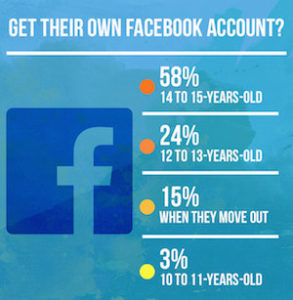
Social Media: While most parents would not allow their children to open social media accounts, one third said that middle school was a good time to allow it. As a clinician who has worked with teen girls I can tell you that the middle school girls I saw not only were unable to self-regulate the amount of time they spent on their device, they also dealt with more issues of cyber-bullying and struggled with the skills on handling online misconduct. Many of them disclosed to me in confidence their online mishaps, conversations, and bullying…all of which parents are completely unaware. Middle schoolers are just beginning to be aware of other people around them and cannot conceive the cruelty that humans are capable of, much less handle it on their own. For some of them, thoughts of ending their life held the answer when they could not figure out another way.
I recommend teens in high school utilizing beginning accounts like Instagram, Facebook, and Twitter, while being consistently monitored (not dissected) by parents. Not for the sake of voyeurism, but to look for talking points on handling online misconduct and affirming self-regulation (the self control needed to movein and out of the digital world into reality). If you allow your middle schooler social media, make sure you are aware of who they are talking to and friending at all times.
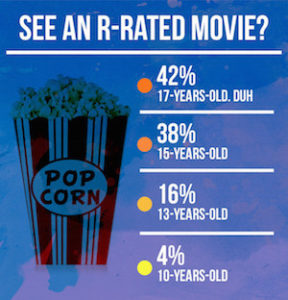 Adult Content: This one really surprised me. On one hand, parents were almost unanimous on the idea of their child/teen getting a permanent tattoo. In fact, the number one answer was “LOL” or Laugh Out Loud. It was a humorous idea to parents that they would consider allowing their teens to make such a life changing decision. Yet, when it came to exposing their children to adult content and violence often found in rated “R” movies, 38% were fine to allow their 15 year old, 16% a 13 year old, and 4% actually would allow a 10 year old. Considering the film industry is allowing more graphic scenes in movies than ever, I’m not sure these parents are tracking the effects of images, violence, and almost pornographic material being introduced so young. I was shocked at the previews before the recent Avengers movie I took my boys to (ages 8 and 11yrs). It was rated PG-13 and I had researched it beforehand only finding a few cuss words to give it such rating. An “R” movie is even worse. It has long been known that these images produce not only a curiosity for more but introduce them to concepts about sex, relationships, and violence before the parent’s (hopefully heathy) teaching has had a chance to take root.
Adult Content: This one really surprised me. On one hand, parents were almost unanimous on the idea of their child/teen getting a permanent tattoo. In fact, the number one answer was “LOL” or Laugh Out Loud. It was a humorous idea to parents that they would consider allowing their teens to make such a life changing decision. Yet, when it came to exposing their children to adult content and violence often found in rated “R” movies, 38% were fine to allow their 15 year old, 16% a 13 year old, and 4% actually would allow a 10 year old. Considering the film industry is allowing more graphic scenes in movies than ever, I’m not sure these parents are tracking the effects of images, violence, and almost pornographic material being introduced so young. I was shocked at the previews before the recent Avengers movie I took my boys to (ages 8 and 11yrs). It was rated PG-13 and I had researched it beforehand only finding a few cuss words to give it such rating. An “R” movie is even worse. It has long been known that these images produce not only a curiosity for more but introduce them to concepts about sex, relationships, and violence before the parent’s (hopefully heathy) teaching has had a chance to take root.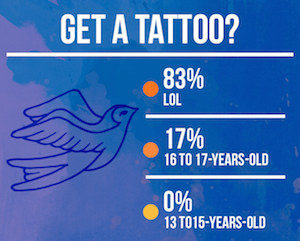 Compare this to the poll that address when to have the “sex talk”. With 58% willing to let children under 15 years watch an R movie, 29% are waiting till the “teen years” (implying 9th grade and up) to talk about sex, and 7 % aren’t even willing to talk about it. So let me get this right, more than half of parents don’t mind letting Hollywood educate their children for them, one third will wait until too late to talk about it, and some consider it not their responsibility at all. Follow this with when they think a child should be able to date- a time when they should definitely know what sex is, what it is for, and how they should be treated in a relationship.
Compare this to the poll that address when to have the “sex talk”. With 58% willing to let children under 15 years watch an R movie, 29% are waiting till the “teen years” (implying 9th grade and up) to talk about sex, and 7 % aren’t even willing to talk about it. So let me get this right, more than half of parents don’t mind letting Hollywood educate their children for them, one third will wait until too late to talk about it, and some consider it not their responsibility at all. Follow this with when they think a child should be able to date- a time when they should definitely know what sex is, what it is for, and how they should be treated in a relationship.Again, I was pleased with the majority vote of 57% waiting until a teen is 16yrs which I will address in a moment. But again, 33% said 14yrs old and 4% actually said 12yrs. From my time with tween and teen girls. I can say that this almost 40% is in for a painful familial breakdown once they open pandora’s box of dating younger than 16yrs. I heard a speaker once state that a freshman teen girl will date anything that walks. The teens and I laughed when we heard it, but honestly, I saw it to be incredibly true and most of the teens agreed with it in their therapy sessions alone with me. I dealt with more issues of mistreatment, cyber-bullying, sexting, inability to be alone, and negative affects on self-esteem with girls under the age of 16yrs who had been allowed to date. Freshmen in high school or middle school were often targeted by older boys who could not find someone to date their own age, and of course what girl wouldn’t want an older boy wanting to date them? Thus dating anything that walked. They seemed to have an inability to screen for the “good” boys and more quickly attached their self worth to whether they were “datable”.
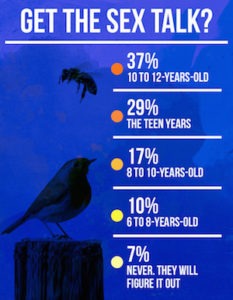
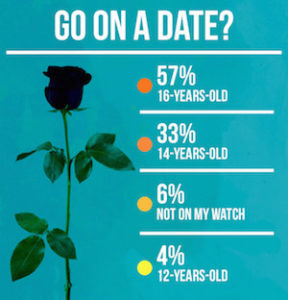 In summary, America- you are doing it wrong. Most of you are headed in a good direction, but the rest of you are playing with fire. Do not overestimate your child’s ability to handle adult situations or know what to do with them when they are exposed to it. Consider waiting until your child proves their ability to balance the digital world with the real world- but that means you must model it first. Liking the opposite sex and wanting to date them will be inevitable, they will even try to sneak it online, but your involvement and teaching will be what they look back on and appreciate. While I am not advocating a suffocating approach that over-restricts the growing independence of a teen, I do recommend a gradual “letting go”, a gentle hand off that guarantees a teens ability to handle the world.
In summary, America- you are doing it wrong. Most of you are headed in a good direction, but the rest of you are playing with fire. Do not overestimate your child’s ability to handle adult situations or know what to do with them when they are exposed to it. Consider waiting until your child proves their ability to balance the digital world with the real world- but that means you must model it first. Liking the opposite sex and wanting to date them will be inevitable, they will even try to sneak it online, but your involvement and teaching will be what they look back on and appreciate. While I am not advocating a suffocating approach that over-restricts the growing independence of a teen, I do recommend a gradual “letting go”, a gentle hand off that guarantees a teens ability to handle the world.Talk with your children about sex. In a poll I did with teens (which is consistent with other larger polls), children are exposed to their first form of pornography (online or in print) between the ages of 8-11yrs. It is your responsibility to educate your children, not the world. Even worse is expecting them to educate you. If you wait for the culture to do it, you will find yourself and your family out of control before you know it.
-
Moms, Meltdowns, & Cupcakes
It was the last week of school, my last week of work, and we were getting ready to move (again) in a month. Everything seemed to be peaking into this nice opportunity for a meltdown. I was late getting teacher’s gifts, and the double birthday party I had been planning for my two boys’ classrooms (out of sheer guilt that our military calling would be pulling them away from their friends again) had been canceled due to the amount of chaos swirling around me. I felt I had already disappointed them once by postponing, and my youngest’s teacher had emailed me (again) about his behavior at school. I was drowning in the quicksand of mommy-shame. But, this particular morning, I had a winning thought, I can get cupcakes for their classrooms! In one act of service on my way to work, I can help my youngest make amends and give them a chance to have a birthday send off all at once! Several boxes checked. I suddenly felt the pride of a Supermom moment. You know, like when you get the kids off to school, have had breakfast, and you still had time to clean up the kitchen? That feeling only lasted a moment until I stood in the bakery section of Walmart, paralyzed, staring at cupcakes.
I have 50 children, should I get the mini-cupcakes or the full-size? I have no idea. 50 is a lot and will be expensive to get the full-sized. I’ll get the mini ones… but what will my children feel when walk in with mini-cupcakes? Have their friends brought in full-sized for their birthdays? Will they feel cheated, less loved? What about the full-sized- that’s a lot of sugar… they have water day today.
I am now envisioning 50 kids throwing up beside the inflatable water slides on water day because Jack’s mom brought full sized cupcakes with massive amounts of frosting. The teachers are looking at me and I now feel responsible to sanitize the giant slides from this disaster.
Do I chance the mini-cupcakes? Will my kids look back and remember the time their mom brought in tiny cupcakes? I’ll call a friend, I can’t make this decision alone… someone understands this situation as the real, serious, life-altering moment that it is. The first friend I think of doesn’t feed her children sugar. Great, I can’t call her! What is that now saying about me that I am loving my child with food, much less an overly sugary treat. I think, Who else has a fifth grader? Ah, yes! Another friend… but she is homeschooling. Great, she hasn’t been buying cupcakes for 50 children lately and now I’m feeling like crap for sending my children to public school and not teaching them myself. Here I am, a competent woman who is frozen in the bakery section with the Walmart staff staring at me. I can’t do this…
I leave for the clothing section since I need to process this situation. As I step outside of myself like an out of body experience, I’m getting pretty mad. I am a mental health clinician that helps women, mothers and their children on a daily basis with their self-esteem and confidence. I have just been named Military Spouse of the Year and somehow represent 1.1 million military spouses in the world and I can’t pick out cupcakes. As I’m pacing down the aisles, I began to wonder how I got here.
At what point did I give my self-esteem to a classroom of fifth graders? When did birthdays become an extravaganza of exhaustion? When did buying cupcakes become an identity crisis? When did Pinterest become the new measuring stick? Why does motherhood have to have so many extremes of perfection? I CAN’T DO THIS ANYMORE.
In that moment, I take a huge step. I am choosing the middle ground. These cupcakes can’t define me, I feel ashamed that for a moment they did.
I march back over to the bakery section on a mission to reclaim my personhood.
If these two awesome boys don’t know that they are loved by this point, something else is wrong. My children are going to have to rough through another military move and are going to be better for it. I am a working mom with my own goals that won’t be prioritized above my family. I will leave the world a better place starting with the fact that I am feeding 50 children cupcakes because they are loved. Some don’t even get cupcakes, right? RIGHT? DON’T THEY KNOW HOW MUCH THEY ARE LOVED!?
(Obviously a breakdown is happening during my attempts to control the situation.) The phone rings. Its Jack’s teacher again describing his meltdown yesterday and we agree I will help Jack apologize to another teacher for saying he hated her during his own emotional flooding and I wonder which parent he got that from. I stood there, staring down those cupcakes as if I was battling a giant- a giant being the “me” I keep thinking I need to be and I bought mini cupcakes.
You know what? My kids never said a thing about those cupcakes after school. By four o’clock they had forgotten about cupcakes.
Why do we do this to ourselves? It is impossible to get it all right every time. What’s more is that it will be forever impossible to crawl into our children’s minds and know their exact need in the perfect moment. By the way, that part of their mind isn’t even for us, it’s for their future spouse. There will only be one person who will be responsible to tend to those needs in their soul and it’s not me. Can we just let go of the perfect-mom measuring stick for once? What we really need is a reminder that the things we think will be most important in our child’s memories will not be what they choose. Do you know what mine is? A plant my Dad got me for my birthday one year. If we parent as if the world revolves around them, they will walk into the world believing it. I hear from so many other women that have put the burden of perfection on themselves only to crumble. I say do you your best, do what’s smart, and embrace the imperfection of it all. I gave 50 children mini-cupcakes, and found myself again in the process.
-
Who is the Child, Who is the Parent?
There is nothing like our kids to bring out, well, the kid in us. And I’m not talking about being playful. What I’m referring to is arguing like a child. Children, tweens, and teens will always frustrate us and bring us to our wits end- they are supposed to. They are one more reminder (consistently) that we are out of control of those around us. We can’t force them to listen, obey, love us, or heaven forbid eat. A lot of parents come to me as their tweens turn to teens when they feel the most out of control. “The won’t listen” “I think they are lying” “What’s wrong with them?” “I’ve done everything I can think of and their still not happy!” and “Why are they choosing to be bad?” But what is it about our children that causes us to lose control emotionally and lower to their level. Sooner or later, parents can find themselves arguing like a teenage peer rather than being the adult in the room.
The first thing we need to remember is that these teens may look like adults, bathe and be responsible (maybe) with their homework like adults, but their brains are not. All too often, parents stop parenting when a child seems self-sufficient from the outside. Arguing and fighting, assuming they think like adults is only going to go from bad to worse. Parents need to understand that the part of the brain that is still developing in the teen is the frontal cortex, where impulse control and future thinking is housed. This doesn’t mean they are unable to think into the future, it just mean it takes 10 times the effort it takes an adult (I’m making that number up, but you get the point). If that is true, then when things get heated, the first thing your teen is feeling is all of their emotions in the moment and no way out. They feel overwhelmed, mad, sad, and probably like they want to escape- all at once. They don’t have the wisdom we adults have that if they just push through the conflict and connect, then the relationship goes deeper and becomes more safe. But of course, that’s assuming that we are indeed having a mature, grown up argument and have learned that ourselves.
When you have parents that have also not learned how to engage in healthy conflict and are still emotionally stuck as teens themselves, you end up with a big fat mess. You end up with a teen that is depending on their parents to teach them how to communicate now completely overwhelmed and beyond frustrated. The only answer for them is to somehow be the adult in the relationship, if they can figure that out. Otherwise, you have a teen that either mimics the immaturity in the home or shuts down completely, often going inward and hating or hurting themselves because they assume they are the problem. When they see their parents scream, stomp their feet, slam doors, call names, shut down, interrupt, drink, and go on the defensive- they might as well just go to their room and stop communicating all together. They can get plenty of that drama at school.
Come on parents, why are we expecting more from our kids than we ask of ourselves? Part of teaching your child how to communicate like an adult means that we have two brains full of feelings and thoughts that both matter. We have to be willing to listen to the tough stuff, the behavior they see in us that is hurtful, doesn’t make sense, and that they need to change. Just because we have “rules” in the home, doesn’t mean that the same rules we had for them at 12 will look the same at 17. They are going to have their own thoughts and feelings about those things and we have to be willing to listen. Adult to adult conversations “should” start to sound like this:
“When you ask me a question and don’t let me answer it, I feel like you don’t care”
“I’m so sorry you feel that I don’t care. I’d like to try again and I’d like to listen to what you have to say.”
We would hope our conversations with our spouse looks like that, why is the same conversation with our teen considered disrespectful? Is it because they are calling attention to something in us we don’t want to see or admit to? Isn’t that the way you would want them to communicate in their future relationships? We, and our home, is supposed to model that. If we don’t provide the place, atmosphere, and courage to practice this, we are setting them up to view themselves as unworthy to be heard, an inconvenience, and that they don’t matter. They need someone to teach them that they have the right to ask someone to change their behavior if it feels wrong or disrespectful, but it starts with the safest relationships around them, which includes us as parents.
So, first that begins with us learning how to communicate more like adults ourselves. Whatever you feel like you need to do to learn how to communicate more effectively, more maturely… start today. This is likely not a new issue, it may be already showing up in your marriage or work setting. Buy a book, join a small group, find a therapist, whatever you need to do to learn new strategies for handling your frustration and triggers. Sometimes previous relationships or conversations are triggered in our mind during conflict, but it often has nothing to do with your child- in that specific moment. It is your responsibility to manage yourself and that is what we want to also teach them.
Second, slow down. When things get heated between you and your child, take a deep breath and realize this is an OPPORTUNITY to teach and coach your tween/teen through how to talk like an adult. Your connection is always more important than the problem at hand. Breathe, remind yourself you are talking to the child and that you are the adult. Remind yourself that you need to be the adult that models healthy communication.
Third, model rather than lecture. Listen to what is going on in them. Ask or help them identify their feelings. Don’t talk them out of it, that is aggressive or passive aggressive (sometimes worse). Listen assertively, which means “Your feelings and thoughts matter just as much as mine do.” Listen for how they may have perceived something, even if it doesn’t make sense to you. To them, it is real- children and teens think in concrete ways and they often accidentally make concrete assumptions. You’ve been in their shoes I’m sure in other adult conversations.
Fourth, own your stuff!! If you took something too personally, got triggered by something else, or hurt them in some way- there is nothing more important here than owning it! Forgiveness modeled in the home is absolutely crucial to a teen’s ability to forgive themselves and keep connections with others. Keep your side of the “street” clean and teach them to do the same by taking responsibility for their part. Don’t expect them to do this if you are not modeling it yourself.
Finally, remember that it is often what we have said in anger that our child will remember the most. It’s not what we “meant to say”, it’s what we said, or worse- how we said it. Saying “I’ve had it” really sounds like “I give up on you.” “This is too difficult, I don’t know what else to do” actually sounds like “You are too much for me.”
Being a parent is possibly the most difficult thing in life, second probably to marriage. Do the hard work, be willing to grow yourself. Family is a crucible for chaos that eventually leads to a more healthy, balanced, and mature existence, hopefully for everyone.
-
Coming Back from the Silence

If you are looking for an inspirational story, this is it. Watch or listen to my interview with Lindsay Swoboda, a military spouse and new blogger. In this interview, she takes us into a difficult season of her marriage where she found herself feeling incredibly disconnected from her husband and decided to make an inspiring change. She took the Sacred Spaces Challenge and committed to pursuing her spouse in a new way for 365 days! She is currently the owner of the Uplifting Anchor blog where she encourages other military spouses in their everyday experiences. Find a link to her blog in the links above!
-
Parenting Series (4 Parts)
Parenting with Small Kids
Marriage can often feel like a partnership more than a marriage during the years of raising kids. So many families talk about missing the intimacy they used to have and life feeling more like survival. Sure enough, it can feel like you are more shoulder-to-shoulder during this season. In this episode, we talk about how you can make more face-to-face time with your spouse as well as find ways to be more protective of it during the parenting years. We will talk about how to handle conflict, plan dates, as well as navigate the struggle of different parenting styles. A must-listen for military and first responder couples who often feel like ships passing in the night. Here is what others have said: 1. Always make an effort to treat each other as we would a guest in our home. Common courtesy and everyday kindness makes all the difference in the world. A simple “Can I get you anything” or “Can I help with that” have kept our marriage first. 2. Staying positive is really important and although it can be challenging at times I have found it always helps us get back to that sweet spot we long for. 3. Taking even ten minutes to talk to each other. It could be at 0500 or 2200….but either way, just spend some time not on an electronic device (provided they are not thousands of miles away at the time) and asking the other person about their day. We attend Bible studies and church functions where we can grow spiritually while the kids are doing the same. As the kids get older, the minutes will be easier to turn into hours. But for the very small and precious time the kids are little, my best advice is to make the most quality out of the little bits of time.
Bullying: It’s Not Just Kids Anymore
Bullying is a worldwide epidemic that impacts both children and adults. In today’s culture, we see cyber-bullying impacting adults like never before. Divisive conversations over social media, trolling, and mean-ness is causing people to think twice about staying connected online. During this episode in the parenting series, I sit down with Dr. Bina Patel an expert in workplace dynamics, conflict mediation with women, and conflict mediation between culture/religious groups. Dr. Patel offers strategies you can use in your workplace, volunteer circles and with your kids on how to confront bullies and build confidence. In today’s culture, ♣ 30% of teens in the US have experienced bullying ♣ School bullying: 1 in 4 kids at school have been bullied; 160K kids in the US miss school due to bullying ♣ Gay bullying: 2 to 3times more likely to commit suicide and 30% of all completed suicides have been related to sexual identity crisis in the US. ♣ 9 out of 10 LGBT students have reported being bullied at school within the past year. It’s not just for kids, though. Bullying between adults can make the workplace difficult to walk into each day. While many of us grew up being told to ignore a bully, Dr. Patel offers some ways to confront the bully immediately. Dr. Patel offers us an inspiring way to help our children build their self-esteem, find their words, get to the root of their feelings, and become assertive. Of course we all need a little bit of this too! Here are a few tips and resources that Dr. Patel offered: ♣ Confront the bully: don’t ignore it. Turn the negative into a compliment ♣ Love and respect: be confident and love yourself. If you respect yourself, the negativity and harsh words of the bullying will bounce off of you. – you control your own emotions, if you believe that you do, others will not be able to hurt you. ♣ Tell them to stop: point out they’re hurting you (assertive communication) – use the “put yourself in my shoes” technique. ♣ Silence: specific to online bullying- confront them through assertive communication, but do not continue the dialog. This is more harmful to the victim as others are reading it and it is set in writing. Note: if nothing else works, the silent treatment is the best treatment. As the victim, walk away from the bullying. ♣ Online bullying: block posts, delete the posts, report them to Facebook; reach out to the victim either via separate/private message, or stand up for the victim by responding to a bully’s post (assertive communication). Note to Parents: Know your child – know their behaviors, moods, and what makes them tick/happy. If you are cognizant of their behaviors on a normal basis, you will know that something is wrong if your child does not eat, becomes withdrawn, looks sad, etc. Monitor the social media outlets that your child may be using. It is wise to create an account to monitor them, more so that you are aware if someone is bullying them. Be a friend! When your child is depressed, sad, withdrawn, etc, talk them as though you are friends. It is important so that the child feels comfortable they can tell you what is on their mind. One of the books recommended: Confessions of a Former Bully
Parenting Teens with Pam Brummett
On this episode of Lifegiver, I sit down with my good friend Pam Brummett who has raised three fantastic kids, two of them still in high school. It turns out the military doesn’t ruin your kids 🙂
Win-Win Parenting
In this final episode in the Parenting series we are talking about how to apply Steven Covey’s Win-Win habit of 7 Habits of Highly Effective Families to parenting. Trying to get your kids to do chores can be a chore itself often leaving you feeling you are on the losing end. As kids get older, they start wanting to find ways of being on the winning end as well. Win-Win can help you both feel successful while your kids are motivate by their freedom to choose what they do. I also take some time to talk about how teens develop and how you can better understand what is motivating your teen to find his or her peer group or apply themselves to their school work.
-
My Life as a Military Kid
If you have kids, you don’t want to miss this episode. My kids have been begging to be a part of the Lifegiver Podcast, and I thought it would be a great idea to interview them on what it is honestly like to be a military kid. Aidan is 12, and in his second year of middle school. Jackson is 9, and in 4th grade. We sat down for an unscripted interview where I encouraged them to be honest about their life and experiences, both the good and the bad. They share some of their struggles and successes, so you will definitely want to let your kids listen. This is a great one to listen to while in the car and then talk about it at the dinner table later. Dinners together as a family have shown in research to be one of the biggest keys to a successful, connected family. While at dinner, ask your kids what their thoughts were about the podcast, what they identified with, agreed with, or disagreed with. Special thank you to Kelly Keseecker’s son Carter for his courageous Shout Out and Janine Boldrin from, Chameleon Kids Magazine, for hers as well. You can find out more about Chameleon Kids Magazine, the only magazine for military kids, by military kids, here.
-
Parent Fail
It is one thing to go through the constant change in my life, it’s another thing entirely to watch my kids struggle. I feel responsible for their well-being, but how do you know when your kids are really struggling with the constant transition of moving, making friends, and leaving friends? Kids and adults feel stress in similar ways, but sometimes their expression of it may look different. This is a season of transition for #TeamWeathers. We spent a year and half in Georgia and will only spend 6 months here in South Carolina. Knowing this, I saw my youngest begin to struggle. When school started, he picked up a cold that kept him home for a few days. When I noticed his cold was not getting worse and he was avoiding school I felt in my gut that something was off. Mixed with frustration and selfishness (to be transparent) I needed to figure out what my child was feeling but could not express. In this episode, I walk you through my own experience of working with my son. The heartbreak of hearing his stress and the battle of guilt I had to walk through myself. I will give you some tips on behaviors to look for in your children if they are trying to tell you they need help as well as what you can do to help them. Even more, I will address the internal struggle moms go through when we sometimes get it wrong. – Here is a little bit of what I cover: – Hidden Clues to look for when your child is struggling – Why we can’t read their minds- no matter how hard we try – How kids control their world when it feels out of control – How to not spiral into guilt and shame when you miss the clues you child is giving you Special thanks to Kelly Keesecker and her son Carter for the incredible “Shout Out” thanking an important friend who supported them during transitions. This one is definitely worth listening to and sharing with other moms you know. Let’s all be honest… Parenting is hard and you will never get it right every time. But we can all begin to be pick up some tips and be graceful with ourselves. Most of the time (if we allow it) imperfection leads to breathing hope into someone else’s life. Hopefully this will inspire you to do this in your child’s life.



